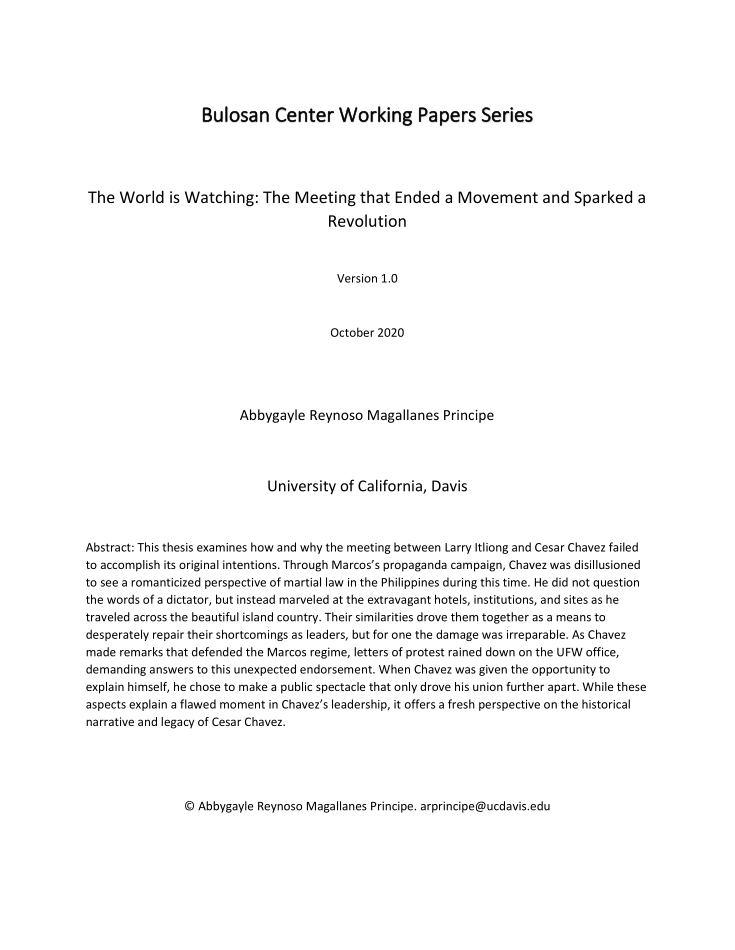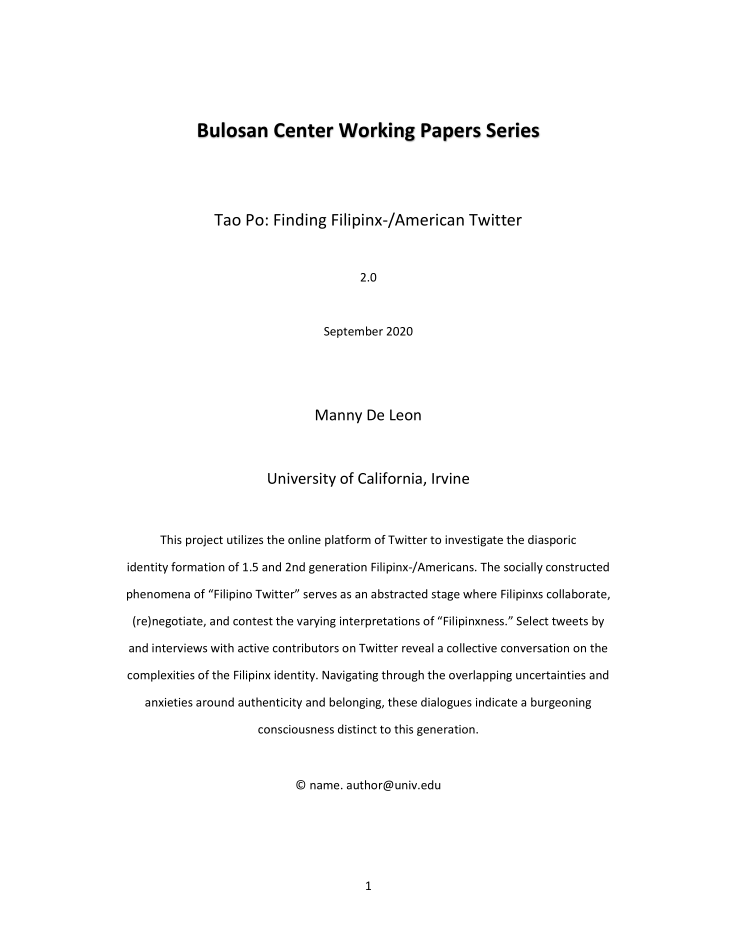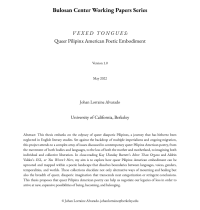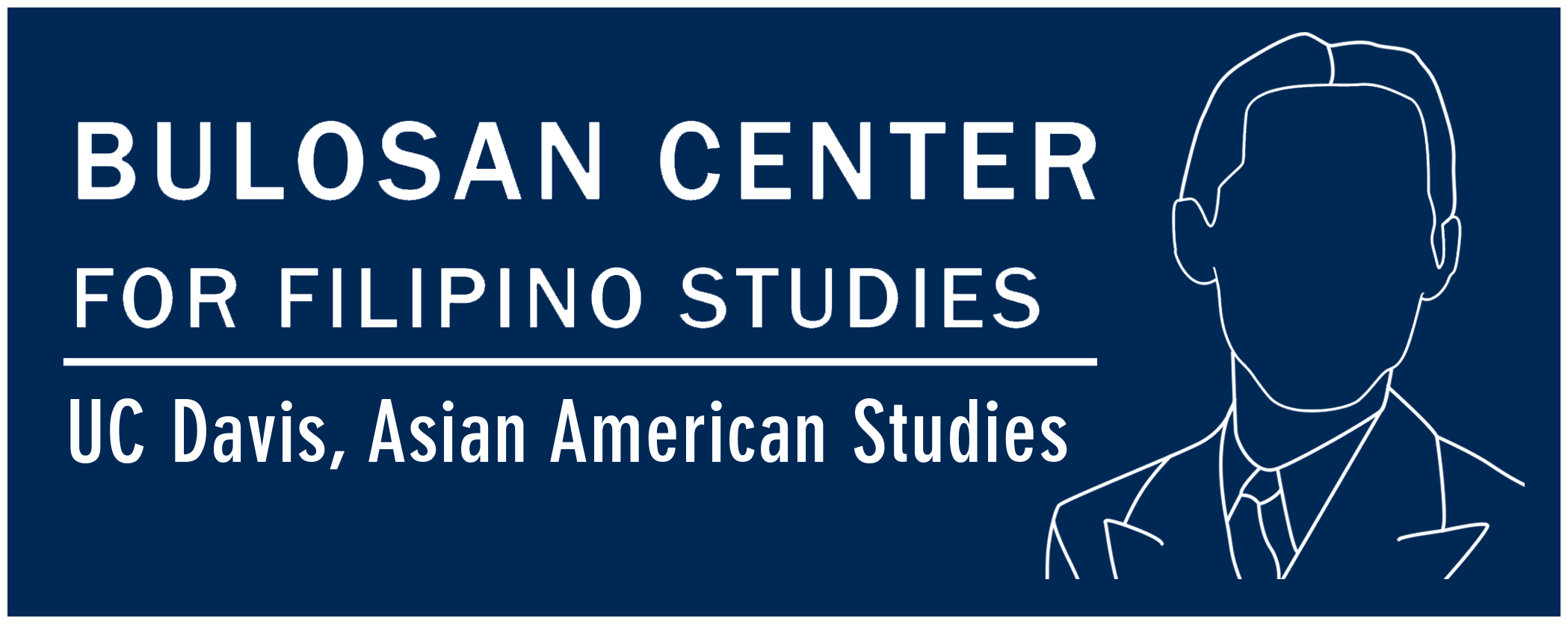Below you will find a selection of work-in-progress scholarly research papers written by Filipinx American students from across the country covering a variety of topics. Please note that all copyrights are retained by the authors—if you wish to cite or use information from these papers in any form, you must first contact the author and receive their permission to do so.
Once you have received permission from the author, Working Papers may be cited using the following format:
Author, “Title,” Version #, (Month, Year), Bulosan Center Working Papers Series
If you are interested in contributing to the Working Papers Series, please review the following submission guidelines and then send your manuscript to Bulosan Center Senior Editor Nicholas Garcia at niagarcia@ucdavis.edu.
Working Papers Series Submission Guidelines.pdf
 Abbygale Principe (UC Davis)
Abbygale Principe (UC Davis)
Title: The World is Watching: The Meeting that Ended a Movement and Sparked a Revolution
Abstract: "This thesis examines how and why the meeting between Larry Itliong and Cesar Chavez failed to accomplish its original intentions. Through Marcos’s propaganda campaign, Chavez was disillusioned to see a romanticized perspective of martial law in the Philippines during this time. He did not question the words of a dictator, but instead marveled at the extravagant hotels, institutions, and sites as he traveled across the beautiful island country. Their similarities drove them together as a means to desperately repair their shortcomings as leaders, but for one the damage was irreparable. As Chavez made remarks that defended the Marcos regime, letters of protest rained down on the UFW office, demanding answers to this unexpected endorsement. When Chavez was given the opportunity to explain himself, he chose to make a public spectacle that only drove his union further apart. While these aspects explain a flawed moment in Chavez’s leadership, it offers a fresh perspective on the historical narrative and legacy of Cesar Chavez."
File: Principe_1.0.docx
 Manny De Leon (UC Irvine)
Manny De Leon (UC Irvine)
https://sites.uci.edu/taopo/about-me/
Title: Tao Po: Finding Filipinx-/American Twitter
Abstract: "This project utilizes the online platform of Twitter to investigate the diasporic identity formation of 1.5 and 2nd generation Filipinx-/Americans. The socially constructed phenomena of 'Filipino Twitter' serves as an abstracted stage where Filipinxs collaborate, (re)negotiate, and contest the varying interpretations of 'Filipinxness.' Select tweets by and interviews with active contributors on Twitter reveal a collective conversation on the complexities of the Filipinx identity. Navigating through the overlapping uncertainties and anxieties around authenticity and belonging, these dialogues indicate a burgeoning consciousness distinct to this generation."
File: DeLeon_2.0.pdf

Johan Lorraine Alvarado (UC Berkeley)
Title: Vexed Tongues: Queer Pilipinx American Poetic Embodiment
Abstract: "This thesis embarks on the odyssey of queer diasporic Pilipinxs, a journey that has hitherto been neglected in English literary studies. Set against the backdrop of multiple imperialisms and ongoing migration, this project attends to a complex array of issues discussed in contemporary queer Pilipinx American poetry, from the movement of both bodies and languages, to the loss of both the mother and motherland, to imagining both individual and collective liberation. In close-reading Kay Ulanday Barrett’s More Than Organs and Aldrin Valdez’s ESL, or You Weren’t Here, my aim is to explore how queer Pilipinx American embodiment can be uprooted and mapped within a poetic landscape that dissolves boundaries between languages, voices, genders, temporalities, and worlds. These collections elucidate not only alternative ways of mourning and healing but also the breadth of queer, diasporic imagination that transcends neat categorization or stringent conclusions. This thesis proposes that queer Pilipinx American poetry can help us negotiate our legacies of loss in order to arrive at new, expansive possibilities of being, becoming, and belonging."
File: Alvarado_1.0.pdf
